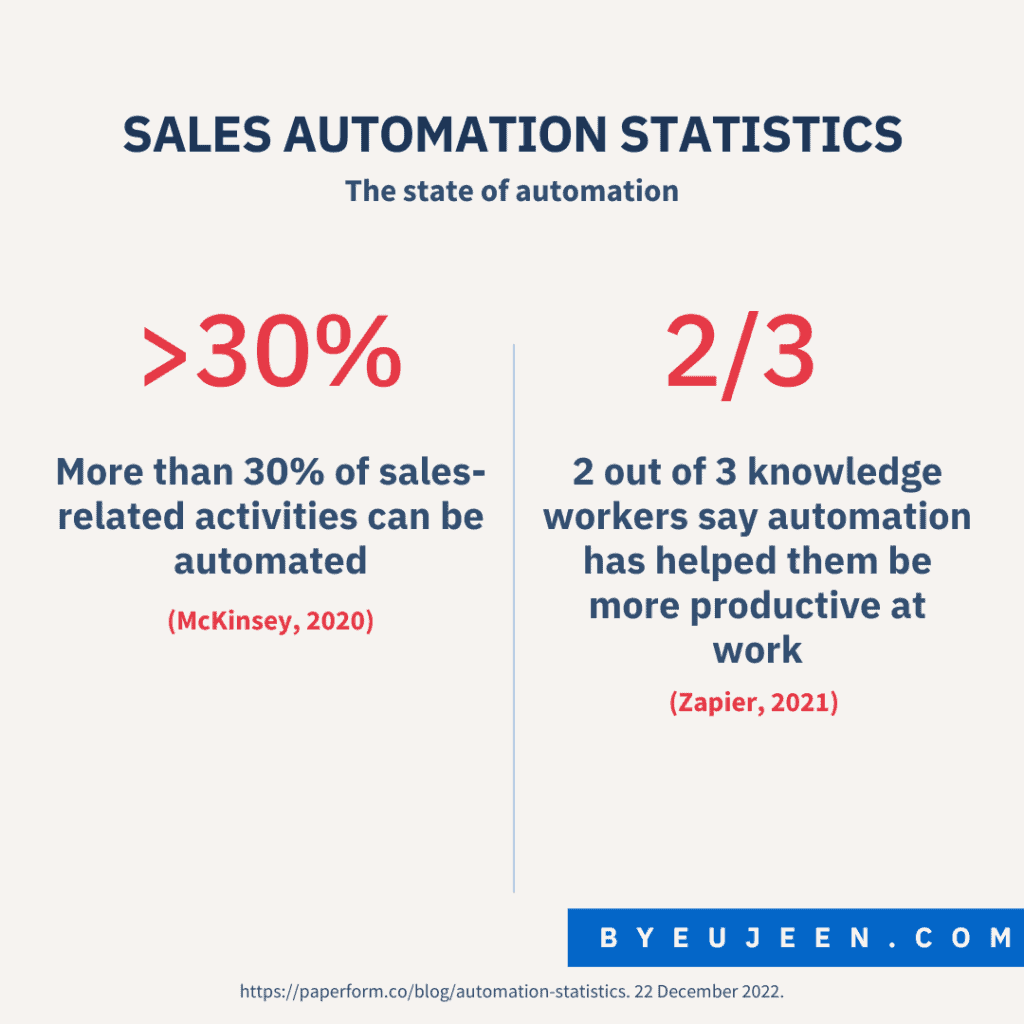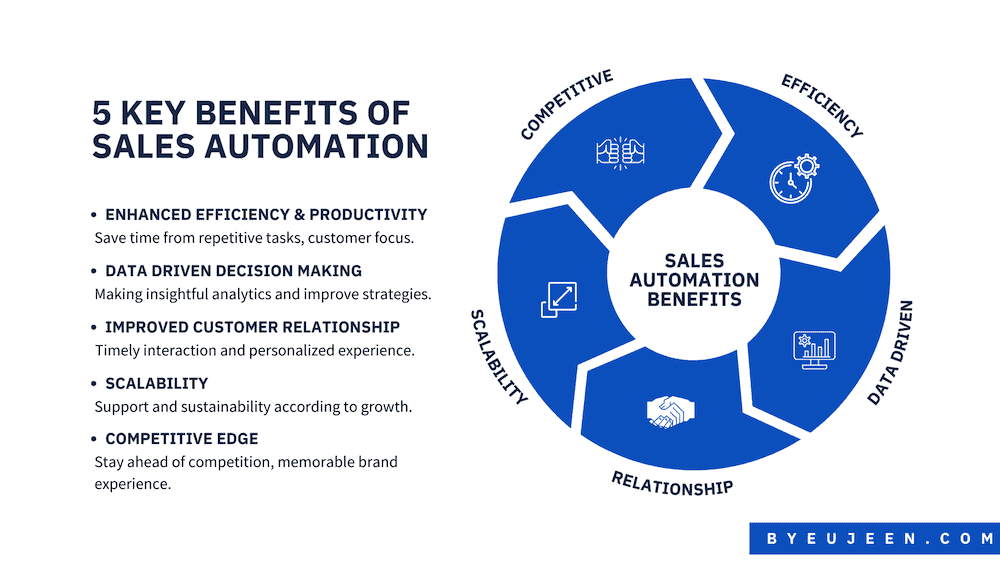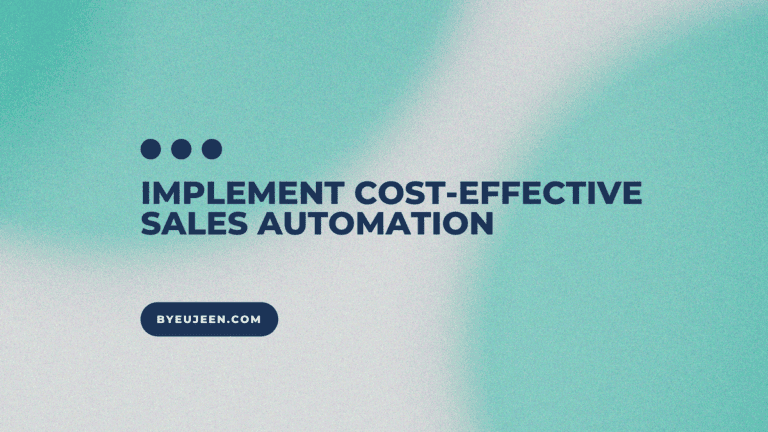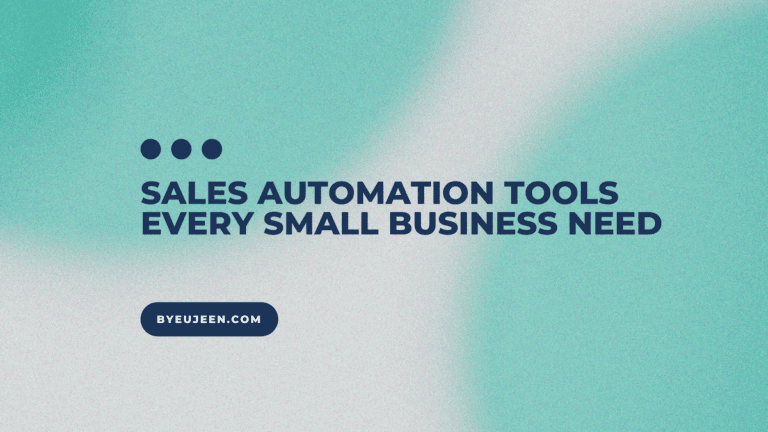Why Small Businesses Need Sales Automation Now to Thrive in 2024
Why small businesses need sales automation now?
In 2024, small businesses find themselves at a crossroads—adapt digitally or risk falling behind.
Sales automation emerges as a vital technology that optimizes sales processes and makes small enterprises more competitive in a digitized market.
According to Automation Statistics compiled by Paperform, over 30% of sales-related activities can be automated, and 2 out of 3 knowledge workers say automation has helped them be more productive at work.

It’s no longer just a futuristic ideal; it’s a necessary tool for handling the increasing complexity and speed of business transactions today.
Trust me, I’ve been there. In my previous career as an airline territory sales head, I always had to wait for the head office to compile and send out weekly sales figures. However, my work completely transformed once the company started implementing automation in the sales reporting system.
Instead of waiting for head office to compile and send out the weekly sales figures, I can just login to the system on the day the raw sales data is available and compile that week’s sales figures. Suddenly, tasks that take hours were handled in minutes, leaving sales team with more bandwidth to focus on strategic initiatives and keeping customers happy.
So, whether you’re looking to boost sales, reduce human error, or consolidate your sales process, you’ll find invaluable insights and practical advice here.
Are you ready to see how automation can enhance your small business’s success? Let’s get to it!
Key Takeaways
- Understand the essence of sales automation and why it is critical for small businesses.
- Study the difference between sales automation and marketing automation and why both are essential in business.
- Explore the multifaceted benefits of sales automation for small businesses, from time savings to increased sales efficiency.
- Learn about the various sales process automation to enhance your sales strategy.
- Discover how to select the right automation tools to match your business’s unique needs and objectives.
What is Sales Automation? Why Small Businesses Need Sales Automation?
Sales automation is a game-changer for small businesses, especially in the fast-paced environment of 2024.
It refers to using software to automate repetitive manual tasks, such as lead generation, data entry, and customer follow-ups. Sales automation software not only saves time but also increases accuracy and efficiency.
For small businesses, where resources are often limited, automation enables sales reps to focus more on high-value activities like building relationships and closing deals.
The strategic deployment of a sales automation platform can significantly enhance productivity and competitiveness in the market.
What is the Difference between Sales Automation and Marketing Automation?
Sales automation and marketing automation may seem like two peas in a pod, but peel back the layers, and you’ll uncover a world of difference.
Sales automation, the savvy sidekick in the sales world, aims to streamline repetitive tasks, liberating sales teams from administrative burdens. Picture this: a sales rep with automated follow-up emails effortlessly nurturing leads while sipping their morning brew.
Conversely, marketing automation takes center stage in marketing, orchestrating campaigns with precision. Think of it as the conductor of your marketing symphony, harmonizing email drips, social media posts, and ad campaigns to captivate your audience.
But here’s the kicker: while sales automation is tailored toward closing deals, marketing automation is about wooing prospects and building relationships. It’s like the difference between sealing the deal with a firm handshake versus wooing them with a charming smile.
So, when navigating the ever-changing landscape of sales and marketing, remember sales automation is the handshake; marketing automation is the smile. Both are essential players in the game, working together to unlock the secrets of success.
5 Key Benefits of Sales Automation for Small Business
The advantages of using sales automation are vast and varied, impacting every aspect of a business’s sales and marketing operations. Here are five key benefits:

Enhanced Efficiency and Productivity
Automation eliminates time-consuming tasks like data entry and schedule management. It reduces human error and frees your sales team to focus on what they do best—creating personalized customer strategies and closing sales.
Data-Driven Decision Making
With sales automation, every customer interaction in the sales funnel is tracked and analyzed, providing a wealth of data. This information enables more intelligent decision-making and helps fine-tune sales strategies in real-time.
Improved Customer Relationships
Sales automation tools can help ensure consistent and timely communication with customers. Businesses can offer a more personalized and responsive service by automating follow-ups and maintaining a detailed history of customer interactions.
Scalability
As your business grows, the right sales automation tool grows with you. It supports larger customer bases and more complex sales processes without a corresponding increase in overhead.
Competitive Edge
Sales automation gives small businesses a competitive advantage. By streamlining operations and leveraging data for better decision-making, companies can offer superior customer service and outpace competitors.
Examples of Sales Processes Can Be Automated
Here, we explore various sales processes that can be automated to reduce workload and improve outcomes, from lead management to post-sale customer follow-ups. We show you practical ways to implement these tools for optimal effectiveness.
Appointment Scheduling
Streamlining appointment setting by automating scheduling with prospects minimizes unnecessary back-and-forth communication.
This simplification makes it easier for prospects to connect with your sales team, enhancing the customer experience and accelerating the sales cycle.
Lead Scoring and Segmentation
Automated systems score leads based on engagement metrics like website visits and email interactions, allowing sales teams to prioritize leads with higher conversion potential.
Segmentation further refines this by categorizing leads by industry or interest, tailoring marketing automation efforts more effectively.
Emails and Follow-Ups
Utilize email automation to send timely, personalized communications at pivotal moments in the customer journey.
This strategy ensures relevance, boosts engagement rates and strengthens relationships with potential customers.
Sales Reporting
Automated reporting tools compile data across the sales pipeline into detailed reports without manual input.
These insights help identify trends and areas for improvement, empowering sales leaders to optimize strategies and enhance sales performance.
How to Choose the Best Sales Automation Tools?
When choosing the best sales automation tools for your small business, it’s crucial to make a strategic selection that aligns with your business’s specific needs and future goals.
Here’s a detailed approach to ensure you pick the right tools:
Define Your Needs
The first step is thoroughly assessing which sales tasks are the most time-consuming and pinpointing where your bottlenecks lie.
This clarity will guide you to tools that specifically improve these areas. Remember, the goal is to enhance efficiency without compromising the quality of your customer interactions.
Seek Scalability
For small businesses, growth is not just a goal; it’s a necessity.
Opt for tools that can grow with your business, handling more complex sales processes and a larger volume of transactions as you expand.
Prioritize Integration
Ensure the tools integrate seamlessly with your existing systems to maintain a smooth workflow and unified data insights.
Whether it’s your CRM system, email marketing software, customer service platform, or any other tool, sales automation can help complement and enhance your existing ecosystem.
Consider User-Friendliness
Choose easy tools for your team to encourage adoption and minimize training time.
If the software is too complex or unintuitive, it’s likely to be underutilized or even resisted by your team.
Many vendors offer demos or trial periods, which are excellent opportunities to test the tool’s usability in a real-world setting.
Evaluate Support and Training
Check the vendor’s ongoing support and training options to maximize your tool’s potential.
A vendor that offers comprehensive training and responsive support is more likely to help you maximize the benefits of your investment.
Check for Customization and Automation Features
Look for flexible tools tailored to your unique business processes and automation needs.
The best automation tools provide flexibility to adapt to your unique sales tasks, allowing you to automate as much or as little as you need.
Review Feedback and Testimonials
Investigate what current users say about the tools, focusing on reviews from businesses similar in size or industry to yours.
Online reviews, case studies, and testimonials can provide insights into the tool’s performance, reliability, and company’s customer service.
Final Thoughts
Sales automation isn’t just another tool—it’s a strategic investment in your business’s future. It’s about doing more with less, scaling effortlessly, and delivering exceptional customer experiences.
Think of automation not as an option but an essential strategy for staying competitive and dynamic in a rapidly evolving market.
Now, the real question is not whether it suits your business; it’s just how soon you can begin implementing it to reap the benefits.
Frequently Asked Questions (FAQs)
What should I look for in a sales automation tool?
Look for integration capabilities, scalability, ease of use, and strong vendor support to ensure it aligns with your business needs.
Can automation help my sales team be more personable?
Absolutely! Automation frees up your team to focus on building genuine relationships, ensuring that technology enhances rather than replaces the human touch.
How do I know if my business is ready for automation?
If you’re aiming to boost efficiency, manage growth, or enhance customer engagement, it’s time to consider automation.
Will automation replace my sales team?
No, it supports and enhances their productivity by 14.5%, not replace the personal connections crucial to sales.
How quickly can I see results from implementing sales automation?
The timeline for seeing results from implementing sales automation can vary depending on the chosen tools and their implementation. However, many businesses begin experiencing improved efficiency, lead management, and customer engagement within the first few months.



